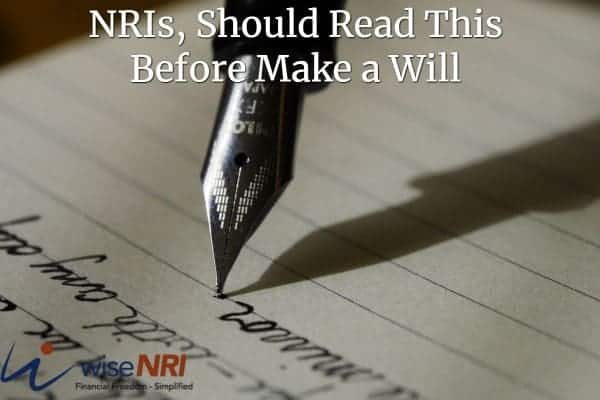With growing incomes, NRIs garner assets all over the world, and not only in India. With assets scattered all over the world, there are challenges related to their management and inheritance. The former you can take care of with estate planning but for the latter, you must plan ahead.
The rules for the inheritance of properties are complex and different in each country – because they are mostly governed by their customs and traditions. Therefore, NRIs must make sure in every possible way that their wealth is passed on to their heirs to whom they wished it to, and not in any other way.
The best way is to make a WILL detailing all assets located all over the world and bequeath it to the heirs in whatever way you wish to get it. Though making a will is not a mandatory requirement, the laws of each country are different in how your movable and immovable property is transferred to your legal heirs if you do not make one. So, it is not best to leave anything to chance.

Read More –Mr. NRI – How Much Retirement Corpus Is Enough
To put it simply, as part of your succession planning, you must make separate wills for properties in India and for properties abroad. When you are making a will as an NRI there are many questions you need an answer for, and they are:
- Should it be natural succession or wills?
- Is a separate will required for properties located overseas?
- How do one make a will that will uphold?
- Who is an executor, and should there be separate executors for each country?
Here is Guide Before Making Will for NRI
Succession vs. Will
In India, due to traditions, succession laws in India are governed by the personal laws of the religion the person belongs to. Therefore, Hindus, Jains, Buddhists, and Sikhs are covered by the Hindu Succession Act, the Muslims, Christians, and Parsis by their respective personal laws.
For the property located overseas, the jurisdiction of Indian laws does not apply, even if you are an Indian citizen, and their local laws apply.
When one is no more and the is not a proper will to distribute their property, there can be many farce claims on the estate, with sometimes families being torn apart. Therefore, we strongly suggest that you make one or multiple wills, as you may prefer, and get it signed by two witnesses. If one of the witness is a doctor, it is better because s/he can testify to your being of sound mental health.
Succession laws of each country depend on:
- The country of your residence – if there are mandatory heirship or community property laws applicable?
- The country of demise.
- The country and place of immovable properties.
- The country, place, and form of movable properties.
Should one make country-specific separate wills?
Again, not necessary, but highly recommended. It is a good idea to make and register separate wills for each country where have movable or immovable property.
You must remember that in some countries a part of the property is mandatorily passed on to legal heirs in a fixed ratio or it is treated as community property (jointly owned by the spouses) as per their laws. Therefore, you must follow the local laws in preparing the wills and get it registered with the local authorities, and submit a copy of the registered will to the local Indian Embassy.
You can also make the same will where you list all your properties, around the world, and get it registered in each country, separately, where you have interests. But this can prove to be a bad idea in case you need to change the will at a later date.
One other way is to prepare and register a master will in India, with the list of all properties, and make separate wills for each country for faster execution of the will.
If the country demands that you register a separate will for NRI for all the properties you own there, then always do it. Not knowing the succession laws of the country, you reside in, is not an excuse admissible in courts.
If the country of residence imposes inheritance taxes, then also it makes sense for you to make a separate will for properties located there, thereby saving your legal heirs from paying unnecessary tax later.

Must Check –Planning For Retirement In India
How to make a proper will for NRI?
In general, a handwritten in one’s own handwriting, or a typed document with proper signatures of the most recent date is enough to make a will. But for making it uphold in the court of law, in case of unpleasant disputes, one should follow the following process, in India and abroad:
- Get the will type/written in clean handwriting.
- Sign the will in front of two witnesses – they do not need to know its content, just the fact that you signed it in front of them.
- Have the witnesses sign the will and put their contact details and addresses.
- Appoint an executor for the will who will ensure that you wishes are carried out in letter and spirit.
- Get the will attested from the Notary Public office.
- Register the will in the local equivalent of the registrar’s office.
- If you are outside of India at the time of making the will get it registered at the local Indian Consulate.
Remember, that nomination is the same as having a will and transferring the property by way of inheritance. A nominee is just a legal representative who will ‘handle’ your assets after your demise and it may be any person you deem fit. The nominee may or may not be your legal heir, or not in the proportion that you may wish.
Who is an Executor?
An executor of a will can be any person or institution you may appoint to carry out your last wishes as per your NRI will. In most cases, the task of the executor is simple and finishes after the peaceful transition of the property to the legal heirs. However, in some cases, like where the legal heir is a minor, they may have to oversee the estate on their behalf as the trustee till they come of age.
Therefore, appointing an executor is important and must be done very diligently and carefully. You must also make arrangements in the will itself to make the necessary fee and expenses of the executor for their services.
Again, executors can be anyone, residing anywhere, but it is preferable to appoint a local trustworthy person as an executor.
Hope you have a Better idea regarding Things To Remember Before Making Will for NRI. If you have any questions Regarding ‘NRI will’ you can add them to the comments section. Please also share your practical experience if you created and registered a WILL outside India.

Is is possible for me to register a will in india if I am an NRI and under which law?
as a pareent of NRI, what precautions are required while drafting a will?
Can A NRI in Australia make a will, If so what is the process
For NRI, for bank accounts, is it sufficient to have nominees and joint account holders? Is there a need for for a separate will?
Hi Surinder Ji,
Nomination is a very different concept. Even if you have nominees in most of the financial asset distribution will be based on Hindu succession act – if you don’t have a proper WILL.